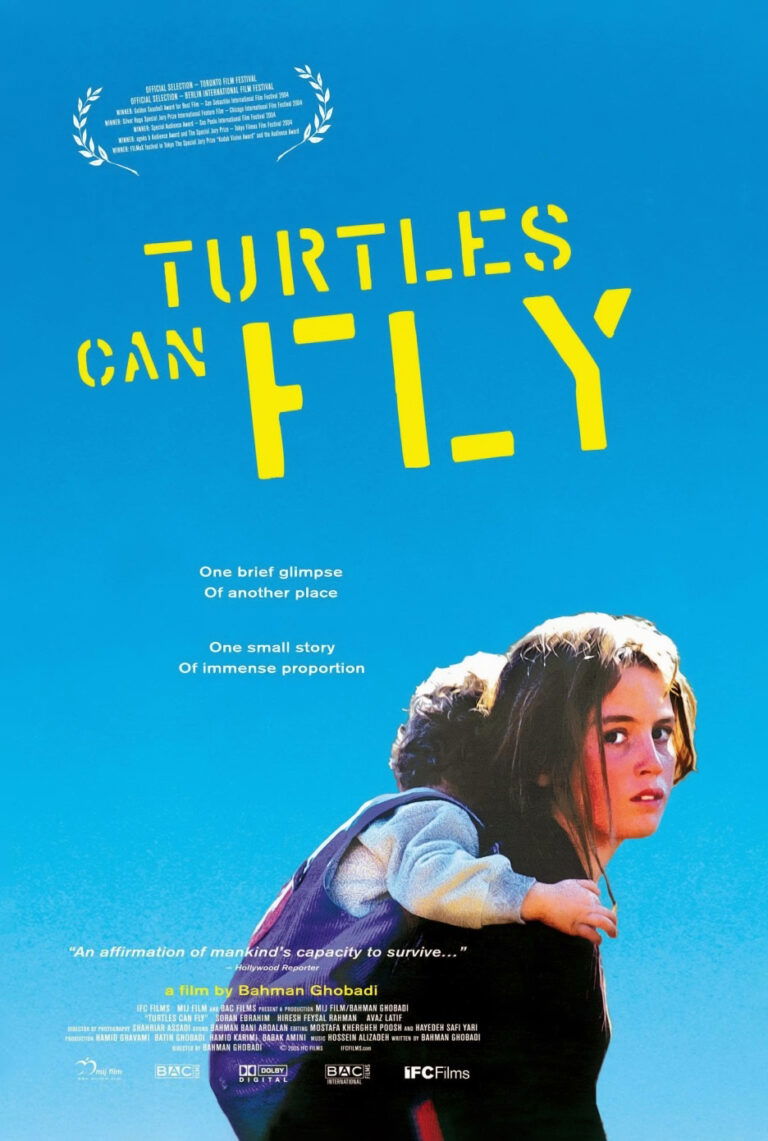“Innocent Victims of War?”

| None | Light | Moderate | Heavy | |
|---|---|---|---|---|
| Language | ||||
| Violence | ||||
| Sex | ||||
| Nudity |
What You Need To Know:
TURTLES CAN FLY ends in murder and disillusionment. Not even God can stop the physical, emotional and spiritual devastation that the war against Saddam visits upon these children. Thus, TURTLES CAN FLY has strong humanist content and a Romantic worldview that attacks both the brutality of Saddam Hussein’s regime and President George Bush’s decision to end it. The movie also contains very strong occult content and disturbing scenes of suicide and the murder of a blind child.
Content:
(RoRo, HH, B, P, PC, OOO, FR, L, VV, N, M) Strong Romantic worldview with strong humanist elements, some strong moral elements, some positive references to American soldiers, and some politically correct, antiwar messages regarding the American invasion of Iraq in 2003 and all wars (including, presumably, wars of liberation), with very strong occult content where disabled boy has repeated occult visions of the future which come true, and, thus, the protagonist believes in his occult powers, as well as references to the false religion of Islam (including, perhaps, some vague Islamic mysticism in the occult content?); two light profanities; brief disturbing scenes of violence include Iraqi soldiers ravage a village, Iraqi soldiers struggle with woman, teenage boy’s foot bleeds from landmine shrapnel, young blind child deliberately drowned, references to suicide, blind child unknowingly walks in mine field, and shell explodes in truck filled with empty shells; no sex; upper male nudity; no alcohol or smoking; and, lying and teenager is bossy, even toward adults.
More Detail:
Satellite becomes attracted to a sad-faced, suicidal girl traveling with her armless brother and a three-year-old blind child. The girl’s brother gets visions and premonitions of the approaching war. Satellite is excited about the impending American invasion and thinks that it will improve the children’s lives. The invasion fails to stop the tragedy that is about to occur, however.
The story in TURTLES CAN FLY ends in murder and disillusionment. Not even God, or Allah, can stop the physical, emotional and spiritual devastation that the war visits upon these children. Thus, TURTLES CAN FLY contains strong humanist content that attacks both the brutality of Saddam Hussein’s regime and President George Bush’s decision to end Saddam’s brutality by invading Iraq. The basic, dominant worldview seems to be Romantic, however, because the movie appears to assume that all the children are completely innocent victims, even one prominent child who commits murder.
Despite the tragic elements in TURTLES CAN FLY, the movie has some very humorous scenes and positive moral content. One of the funniest ones is a scene where Satellite lies to the village elders about what the American cable news network, CNN, is saying about President Bush, Saddam Hussein and Iraq. The movie offers an indelible portrait of this precocious, but compassionate, young teenager, who is eventually torn by the ravages of war.
As such, the movie seems to indict all wars, including wars of liberation. It is possible to be a good Christian and a good conservative and oppose President Bush’s decision to invade Iraq, but, contrary to those people with bumper stickers saying, “War is not the answer,” sometimes war is, indeed, the answer. Ultimately, of course, salvation through Jesus Christ is the final answer for the sinfulness infecting the human race.
Regrettably, TURTLES CAN FLY is shot in a detached, disjointed manner that will dilute the story’s emotional power and moral qualities for average filmgoers, especially those who do not attend foreign language movies regularly. TURTLES CAN FLY also contains very strong occult content about a teenager’s ability to tell the future and disturbing scenes of suicide and the brutal murder of a helpless blind child. Overall, therefore, although the movie has some decent, positive qualities, MOVIEGUIDE® cannot recommend it.


 - Content:
- Content: 

